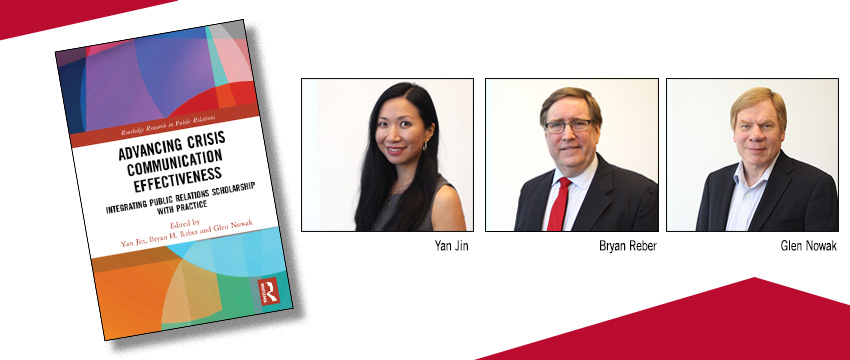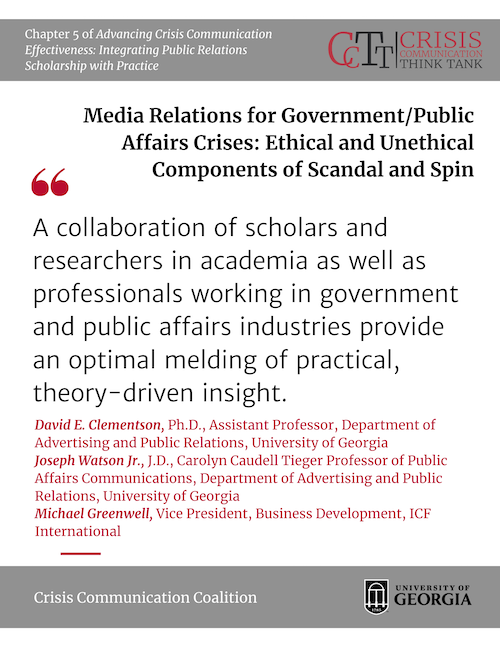New crisis communication book melds scholarly research with practitioner experience

New crisis communication book melds scholarly research with practitioner experience
The intersection of professional experience in crisis communication and theoretical research of the complexities of the topic are highlighted in a new book, “Advancing Crisis Communication Effectiveness.”
Edited by three Grady College professors, this book is an education in navigating the challenges that communicators face to protect public health and safety and shield organizational reputations from crisis-inflicted damage.

The book is edited by Yan Jin, Bryan Reber and Glen Nowak and includes submitted chapters from numerous academic and professional crisis communication thought leaders. Among the subjects covered are crisis communication for corporations and non-profits, the benefits and pitfalls of using social media to cover natural disasters, dealing with misinformation, navigating media relations during governmental and public affairs crisis and examining situational theories helpful in dealing with crisis.
“This book is very translational because it brings together different theories and a diversity of voices,” said Jin, the UGA Athletic Association Professor in Grady College. “We are able to talk about theory and how it can help our practitioners better explain and predict outcomes, making their work more effective. The academics bring value of theory-based insights and the practitioners bring fresh, current challenges to help scholars identify the next research frontiers.”
One topic covered in the book that is especially relevant today is the discussion of crisis and healthcare. Nowak, the director of the Grady Center for Health and Risk Communication, says health communications is an ever-evolving area as the recent COVID-19 outbreak has proven.
“A lot of the assumptions that we have in the health communications space need to be revisited because it’s hard to come up with a simple formula for how to respond,” Nowak said. “Every single day something happens that you didn’t anticipate. As this book illustrates, we need a lot more sophistication both among practitioners and among academics who are trying to do research that will help practitioners.”
The intersection of an academic approach together with a practical approach by professional communicators is unique and made possible through the collaboration of the Crisis Communication Think Tank. The CCTT is a group of invited scholars and practitioners who are experts on the subject of crisis communication. The group builds domestic and international collaborations to advance crisis communication science and practice on emerging topics.
“This book is one more example of how UGA is at the leading edge of the conversation around crisis communication and research,” added Bryan Reber, the C. Richard Yarbrough Professor in Crisis Communication Leadership. “Between the CCTT and the Center for Health and Risk Communication, we are positioned really well to facilitate these discussions and collaborations.”
The subjects covered in the book are based on discussions of the group and are authored by several CCTT members including scholars from University of Maryland, University of North Carolina and the University of Amsterdam along with professionals from UPS, and Imagem Corporativa (Brazil), as well as CCTT-affiliated partners such as the Museum of Public Relations, among others. Several additional Grady College faculty and alumni also collaborated on chapters for the book.
Grady College alumnus Dick Yarbrough (ABJ ’59) wrote the forward to the book and discussed how important it is for communicators to be involved with strategic conversation and the decision-making process. Yarbrough was the managing director of communications and government relations for the Atlanta Committee for the Olympic Games and gained a wealth of crisis communication experience with the Centennial Olympic Park Bombing.
“This book is a perfect blend of the expertise of highly-qualified academicians and the experiences of communications professionals who have dealt successfully with a variety of crises in their own organizations,” Yarbrough said. “I am encouraged that it will be available to current and future generations of communicators.”